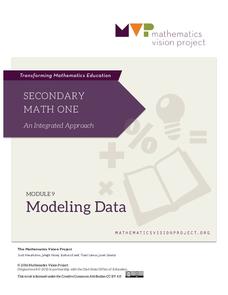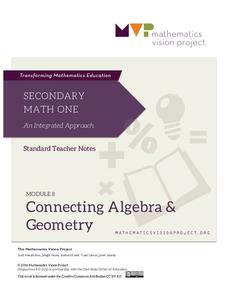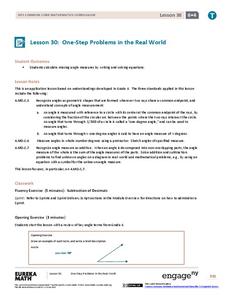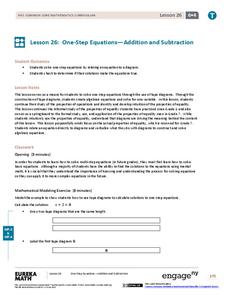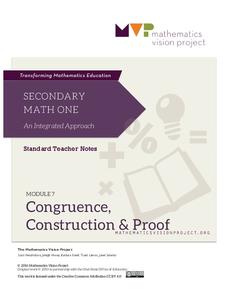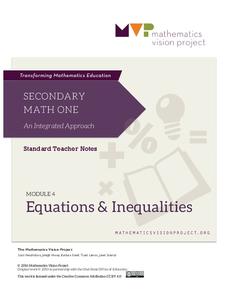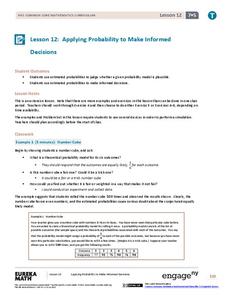California Education Partners
Animals of Rhomaar
Investigate the growth rates of alien animals. Pupils study fictional animals from another planet to determine how much they grow per year. The investigators plot the growth of their animals over a period of time and then compare...
Mathematics Vision Project
Modeling Data
Is there a better way to display data to analyze it? Pupils represent data in a variety of ways using number lines, coordinate graphs, and tables. They determine that certain displays work with different types of data and use...
Mathematics Vision Project
Connecting Algebra and Geometry
Connect algebra and geometry on the coordinate plane. The eighth unit in a nine-part integrated course has pupils develop the distance formula from the Pythagorean Theorem. Scholars prove geometric theorems using coordinates...
Mathematics Vision Project
Systems of Equations and Inequalities
It's raining (systems of) cats and dogs! The fifth unit in a nine-part course presents systems of equations and inequalities within the context of pets. Scholars use systems of inequalities to represent constraints within situations...
Mathematics Vision Project
Features of Functions
What are some basic features of functions? By looking at functions in graphs, tables, and equations, pupils compare them and find similarities and differences in general features. They use attributes such as intervals of...
Mathematics Vision Project
Linear and Exponential Functions
Provide a continuous progression to linear and exponential functions. Pupils continue to work with the discrete functions known as sequences to the broader linear and exponential functions. The second unit in a series of nine provides...
NOAA
History's Thermometers
How is sea coral like a thermometer? Part three of a six-part series from NOAA describes how oceanographers can use coral growth to estimate water temperature over time. Life science pupils manipulate data to determine the age of corals...
EngageNY
One-Step Problems in the Real World
Mirror, mirror on the wall, which is the fairest resource of them all? Individuals write and solve one-step equations for problems about angle measurement, including those involving mirrors. Both mathematical and real-world problems are...
EngageNY
One-Step Equations—Addition and Subtraction
Just one step is all you need to find success in solving equations. The 27th installment in a series of 36 teaches how to solve one-step equations involving addition and subtraction. Tape diagrams help future mathematicians in this task.
Mathematics Vision Project
Congruence, Construction and Proof
Learn about constructing figures, proofs, and transformations. The seventh unit in a course of nine makes the connections between geometric constructions, congruence, and proofs. Scholars learn to construct special quadrilaterals,...
Mathematics Vision Project
Equations and Inequalities
Help learners get their facts in line to build and solve complicated linear equations and inequalities. Pupils build upon their knowledge of solving basic equations and inequalities to solve more complex ones. Individuals work with...
Mathematics Vision Project
Module 1: Sequences
Take steps into sequences. An 11-lesson unit builds upon pupils' previous understanding of writing expressions to develop the idea of sequences. The resource explores both arithmetic and geometric sequences using recursive and explicit...
CK-12 Foundation
Basic Trigonometric Functions: Ladder Length
Climb the ladder to trigonometry. The interactive introduces trigonometric ratios and finding lengths of sides of right triangles created by a ladder and a building. Learners use the interactive to create triangles by moving the top of...
CK-12 Foundation
Basic Inverse Trigonometric Functions: Ladder
Lean a ladder against the wall to create an angle. Class members use an interactive application to determine the angle a ladder makes with the ground. Individuals respond to five questions using inverse trigonometric functions.
CK-12 Foundation
Operations with Vectors: GPS Device
Determine the distance between two hikers using vectors. Pupils use an interactive to develop the formula to find the distance between two points knowing their relationship to a third point. Learners use the formula to calculate the...
CK-12 Foundation
Rectangular to Polar Form for Equations: Polar Coordinates
Plot points around a wheel. Pupils use an interactive tool to plot a point using polar coordinates with the aid of a wheel. Scholars use the interactive to answer five questions to finish the lesson. The resource provides background...
EngageNY
Drawing the Coordinate Plane and Points on the Plane
To plot a point in the coordinate plane, you first need a coordinate plane. Pupils learn to draw an appropriate set of axes with labels on a coordinate plane. They must also determine a reasonable scale to plot given coordinate pairs on...
EngageNY
Rational Numbers on the Number Line
Individuals learn how to plot rational numbers on the number line in the sixth lesson of a 21-part module. They identify appropriate units and determine opposites of rational numbers.
EngageNY
Real-World Positive and Negative Numbers and Zero
Class members investigate how positive and negative numbers are useful in the real world. Individuals first read a short passage and identify terms indicating positive and negative numbers. They consider situations involving positive...
PBL Pathways
Cell Phones
Calling all subscribers! Model revenue based on individual cell phone subscribers. The project-based learning activity presents a challenge to scholars from a cell phone company. Individuals model data provided to them from the company...
EngageNY
Applying Probability to Make Informed Decisions
Use simulations to determine the probabilities of events to make decisions. Class members are presented with several scenarios, some with known probabilities and others without. Groups run simulations to gather data that they then...
EngageNY
Using Tree Diagrams to Represent a Sample Space and to Calculate Probabilities
Cultivate the tree of knowledge using diagrams with two stages. Pupils create small tree diagrams to determine the sample space in compound probability problems. The lesson uses only two decision points to introduce tree diagrams.
EngageNY
Chance Experiments with Outcomes That Are Not Equally Likely
The fifth portion of the 25-part series introduces probabilities calculated from outcomes that are not equally likely. Class members use tables to calculate probabilities of events, add outcome's probabilities, and find...
Noyce Foundation
Digging Dinosaurs
Build a function to solve problems rooted in archeology. A comprehensive set of five lessons presents problems requiring individuals to use functions. The initial lesson asks learners to find the possible number of dinosaurs from a...



